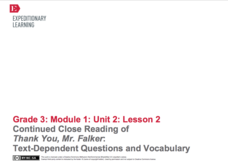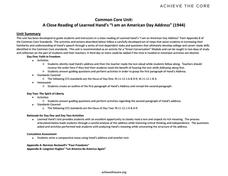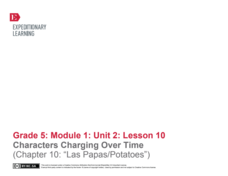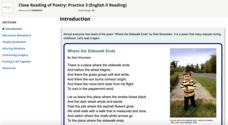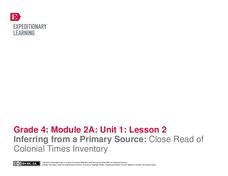EngageNY
Continued Close Reading of Thank You, Mr. Falker: Text Dependent Questions and Vocabulary
In the second lesson plan in a series that revolves around the story, Thank You, Mr. Falker, learners practice the skill of answering direct questions from the text while using complete sentences. After a teacher-led review of how to...
EngageNY
Continued Close Reading of Nasreen's Secret School: Discussions of Questions and Evidence
Third graders answer text-dependent questions of the story Nasreen's Secret School both independently and then collaboratively through using the carousel of questions strategy. This plan is the seventh instructional activity in a larger...
EngageNY
Mid-Unit Assessment: Close Reading of Bullfrog at Magnolia Circle: Bullfrog Life Cycle
The sixth lesson plan in this Bullfrog at Magnolia Circle unit assesses your third graders' ability to read and understand informational text. The included assessment asks learners to take notes about the main idea and supporting details...
Deer Valley Unified School District
Close Reading: Analyzing Mood and Tone
The AP Literature and Composition exam is all about close reading. Test takers are presented with a passage and asked to analyze how an author uses literary devices to create a desired effect. Prepare your students for the exam with a...
Curated OER
A Close Reading of Learned Hand's "I Am an American Day"
Judge Learned Hand's "Spirit of Liberty" speech delivered during the July, 1944 "I Am an American Day" celebration is the subject of a close reading activity that models for learners how to approach a dense, difficult text.
EngageNY
Close Reading: Paragraphs 1–5 of “Water Is Life”
Be more specific. Scholars take a look at domain-specific vocabulary by discussing an anchor chart. They then look at vocabulary words recorded from paragraphs one through five in Water of Life. After analyzing the vocabulary used in the...
EngageNY
Getting to Know Esperanza (Chapter 2: “Las Uvas/Grapes”)
Delve into Esperanza Rising by Pam Muñoz Ryan with close reading and evidence-based, text-dependent questions. Part of a unit series, this well-sequenced, Common Core designed instructional activity draws on material from the previous...
National Endowment for the Humanities
The Monroe Doctrine: A Close Reading
Students identify specific passages in the Monroe Doctrine to events in early U.S. diplomacy.
EngageNY
Characters Changing Over Time (Chapter 10: "Las Papas/Potatos")
Engage further in Esperanza Rising with a focus on close reading and metaphor. Class members zero in on the tenth chapter, examining characters and big ideas. Pupils discuss the text in small groups and as a whole class, and participate...
EngageNY
Understanding Themes in Esperanza Rising
Determining a theme or central idea is greatly emphasized in the Common Core standards. Target that skill though big metaphors and central symbols in Pam Muñoz Ryan's Esperanza Rising. Help your class reach the standard through...
The New York Times
The Careful Reader: Teaching Critical Reading Skills with the New York Times
The 11 lessons in this educators' guide focus on using newspapers to develop critical reading skills in the content areas.
Texas Education Agency (TEA)
Close Reading of Prose: Practice 2 (English II Reading)
The tone is easy to hear but more challenging to detect in written texts. Users of this interactive learn how to closely observe the diction and words writers use to convey their feelings about their subject. They examine passages that...
Germantown School District
Close Reading World Religions: Islam
As part of a close reading activity, individuals respond to three questions and craft two short essays based on a passage about Islam, one of the world most widespread religion.
Texas Education Agency (TEA)
Close Reading of Poetry: Practice 3 (English II Reading)
Poems by Shel Silverstein, Emily Dickinson, Jean Toomer, Maya Angelou, and others offer users of the final interactive in a ten-part set to demonstrate what they have learned about how writers use imagery, metaphors, allusions, and...
EngageNY
Introducing the Process for Close Reading: Meeting Frederick Douglass
To learn more about Frederick Douglass, class members complete close reads of excerpts from Narrative of the Life of Frederick Douglass. They complete a close reading guide and questions for each excerpt. Pupils then add to the...
EngageNY
Close Reading: “Dog Sleds” and “Kayak”
Visualize it! Scholars read pages 12–15 of The Inuit Thought of It and create a visual gist of the text. They then do a close read of the text and create a natural environment anchor chart before answering text-dependent questions.
EngageNY
Close Reading: Understanding Carlotta’s Journey
How do incidents in A Mighty Long Way provoke the author, Carlotta Walls LaNier, to make certain decisions that shape her story? Scholars engage in a close reading of the memoir, analyzing events in US history and Carlotta's personal...
EngageNY
Close Reading: Brown v. Board of Education
What's the connection? Scholars complete a close reading of Brown v. Board of Education and identify connections to Carlotta in A Mighty Long Way. Classmates learn new vocabulary, answer text-dependent questions, and complete a...
Curated OER
Sonnet Explication
Learners analyze close readings of poems, looking up words in the dictionary, and discussing the major parts of dictionary definitions, including word origin and parts of speech. They examine sonnets, then compare/contrast their findings.
EngageNY
Close Reading of Bullfrog at Magnolia Circle: Predators and Prey
Reading is fantastic, especially when it's reading about bullfrogs. Kids get cozy with predator/prey relationships as they hone their information-reading skills. They start out as they read a portion of the text aloud, then they...
EngageNY
Close Reading of The Boy Who Loved Words: How Do People Build Their Word Power?
Third graders practice the skills of identifying the main message in a story, describing the main character, and sorting the key details of a story into specific categories. The story they read is, The Boy Who Loved Words. Using a...
EngageNY
Inferring from a Primary Source: Close Read of Colonial Times Inventory
Teach your class about colonial America through an examination of primary documents. First though, start vocabulary notebooks for content-specific and academic vocabulary. Pupils can keep this record during the entire module. Once this...
CPALMS
Point of View: A Close Reading of Two Bad Ants
Chris Van Allsburg's Two Bad Ants provides third graders with an opportunity to examine point of view and how the point of view of others may differ from their own.
Scholastic
Voyage on the Mayflower for Grades 3-5
Following an online activity, scholars complete a Grafitti Wall in which small groups write words and phrases on chart paper pertaining to Pilgrims, the Mayflower, and Thanksgiving. Pupils perform a close reading then answer a series of...
Other popular searches
- Close Reading Passages
- Close Reading Activities
- Close Reading Exercises
- Close Reading Science
- Close Reading Drills
- Close Reading Tone
- Close Reading Camel
- Poem Close Reading
- Easter Close Reading
- Close Reading Passages Space
- Close Reading Ghost Towns
- Reading Close Procedure


